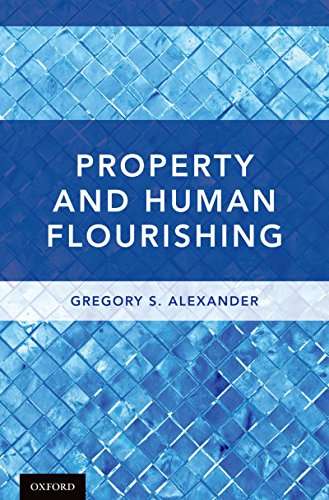The Volokh Conspiracy
Mostly law professors | Sometimes contrarian | Often libertarian | Always independent
My Review of "Property and Human Flourishing"
A link to my review of an important new book on property rights by Cornell law Professor Gregory Alexander.

The Federalist Society Review recently posted my review of Property and Human Flourishing, an important new book on property rights by Cornell law professor Gregory Alexander (a leading property law scholar). I conclude that the book is an impressive work and a valuable contribution to the literature on property rights, but also has some notable flaws. Here is an excerpt:
Gregory Alexander's new book Property and Human Flourishing is a major attempt to remake the theory of property rights on new foundations. Instead of justifying property law on the basis of natural rights or utilitarian welfare-maximization, Alexander seeks to ground it on a theory of "human flourishing." After outlining the foundations of the theory, he then applies it to such varied issues as reparations for historic injustices, the extent to which property owners have the right to destroy their holdings, historic preservation laws, the use of eminent domain, and the alleviation of low-income housing shortages. The book makes many interesting points and is clearly a significant contribution to property theory. But it also has some notable drawbacks.
Most traditional theories of property rights justify them on the basis of natural rights, utilitarian consequentialism, or—occasionally—a combination of the two. Alexander contends that such theories are inadequate, and indeed that no one-dimensional "monist" theory can come close to fully accounting for the value and limits of private property. Instead, he proposes that property be analyzed under a "pluralist" framework intended to promote human flourishing. What does human flourishing consist of? Alexander identifies four key elements: "life, understood to include certain subsidiary values such as health; freedom, understood as including the freedom to make deliberate choices among alternative life horizons; practical reasoning; and sociability…"
In my view, Alexander is right to argue that an adequate theory of property rights should be "pluralistic," as he puts it, and that property law should not be based on any one single value to the exclusion of others. But I fear that his own theory is not pluralistic enough. Among other things, he does not sufficiently explain why his version of human flourishing should be privileged over other considerations, and especially not why it should be imposed even on many people who may be willing to cut back on aspects of Alexandrian flourishing in order to pursue other goals. For example, a loner may not want or need as much "sociability" as Alexander posits to be necessary. Some may prefer to exercise their freedom by making most important decisions by intuition, rather than deliberation. And so on. One of the main advantages of strong property rights is the opportunity they give owners (and often others) to pursue values that may not be respected or even understood by majority public opinion. The same goes for values that may not fit even the best formulations of human flourishing…..
Alexander emphasizes that the human flourishing theory is a consequentialist approach to property law. Whether it can be effectively implemented depends on whether institutions such as courts, legislatures, and bureaucracies can properly apply it under real-world conditions.
But in discussing the application of the theory to various specific issues, Alexander sometimes loses sight of these crucial institutional questions….
In the last part of the review, I highlight a point about Alexander's use of "neighborliness" to delineate the obligations of property owners, one that I think is useful for both scholars and practicing lawyers to keep in mind. Sometimes getting the law involved is not only inefficient but has the potential to poison relationships within the community:
An important part of the analytical framework underpinning Alexander's theory is the idea that many legal limitations on property rights are often justified by obligations of "neighborliness," a metaphor he adapts from Nancy Rosenblum (70-71). Good neighbors, Alexander suggests, recognize that they have reciprocal obligations to other members of the community and so should accept a variety of constraints (71). Perhaps so. But here too, institutional insight is sometimes lacking.
Robert Ellickson's classic study of how actual neighbors settle disputes finds that they often prefer to avoid resort to government-enforced legal rules, in favor of informal negotiation and dispute resolution.[6] Settling disputes without involving lawyers and government officials not only reduces litigation and enforcement costs, but is seen as essential to maintaining true neighborliness. As one California rancher told Ellickson, "[b]eing good neighbors means no lawsuits."[7] That certainly does not prove there should never be formal legal constraints on property rights, or that courts and regulators have no legitimate role to play. But it does suggest that a property theory based on the importance of neighborliness to human flourishing should be wary of imposing extensive legal mandates on property owners.


Show Comments (2)